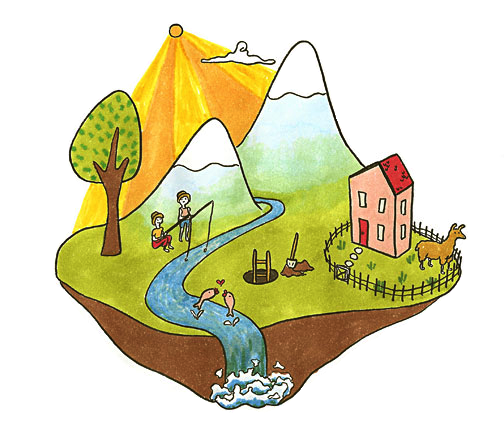Whether the mine is large and highly mechanized, involving earth moving equipment, or small, with people shoveling dirt, the terrible environmental impact of gold mining is unfortunately well established.
Large-scale mining leaves land polluted and destroyed. Once the gold within the land is removed, typically companies pack up or go bankrupt, leaving a toxic mess behind. The environmental and social issues last for years— just look to California, the birthplace of large-scale mining. In addition to the ongoing trauma to Native communities due to the genocide of their ancestors, an estimated 19 to 21 million pounds of mercury from legacy gold mining continues to pour into the watersheds, with much of it ending up in the central valley— one of the major agricultural areas in the US.
Large-scale gold mines continue to wreak havoc on communities and the environment, even though there is no true need to mine additional gold. The only reason large-scale mines exist is to enrich a few people at the expense of our biosphere.
Unregulated small-scale mining is also terrible for the environment, and often destroys the social fabric of communities. Any sudden influx of money can bring with it additional crime and a 'boom-and-bust' economy. As for the environment, unregulated small-scale gold mining is the second greatest contributor of global mercury contamination in the world, after coal-fire plants.

In a holistic and social context, large-scale mining is totally different from Fairtrade small-scale mining. Large-scale mining is about the politics of greed, while Fairtrade small-scale mining is about the politics of bread.
Small-scale miners must mine— this is the only way that they can feed and clothe themselves and their families. Fairtrade Gold first teaches small-scale miners how to work with mercury safely. Then, the program incentivizes the production of eco-gold, giving a 15% premium on gold that is produced without mercury or cyanide. (This process is certainly ideal, but can be difficult to establish because it requires money for equipment and further training.) Regardless of whether mercury is used or not, Fairtrade small-scale mining has stringent environmental standards that do prevent mercury spills.
This makes Fairtrade Gold the best environmental choice for anyone wishing to make a difference in their purchase of jewelry. It is especially better than using recycled gold in jewelry, wedding and engagement rings. Recycled gold is simply dirty gold that has been refined and rebranded as ‘eco-friendly.’
If you are still not convinced that Fairtrade Gold is better for the environment than recycled gold, read this article on recycled gold versus Fairtrade Gold.
*Continue on to the next step in Fairtrade Gold vs Dirty Gold sourcing: Job Market. Or return to the previous step: Indigenous Rights.
*Return to our Fairtrade Gold vs Dirty Gold Infographic in full.
*Or for more info, see our Ethical Jewelry Exposé: Lies, Damn Lies, and Conflict Free Diamonds.